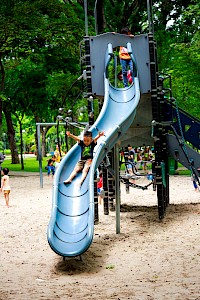
Playground Play
Sadly, we have to say goodbye to the season of Summer, and welcome Autumn. This means there will be perfect weather to take your child to the playground! Many children love going to the playground, it is a wonderful environment for kids to learn, explore, and exert some (or lots) of their energy. There are countless activities that we can focus on during playground play that can help our children’s speech and language develop, as well as gross motor, fine motor and other foundational skills – here are some ideas that you can try at your next visit to your local playground.
Occupational Therapy Activity Ideas
Balancing Beam
- Develops a child’s core stability, static and dynamic balancing, and motor planning skills.
- If you need to make this easier for your child you could help them up, or hold their hand as they cross. To make this harder for your child, they could do this by themselves, and even try walking backwards or balance on one leg.
- It is important that your child crosses the balance beam one foot after the other and does not ‘side-shuffle’, as this requires less of the skills listed above.
Slide
- Develops a child’s body awareness (awareness of where one’s body and parts are positioned in space), which is a foundational skill required for the development of your child.
- Children can do down on their bottom, or stomach head or feet first. This will help regulate their vestibular (balance sense in the inner-ear).
Climbing
- Develops a child’s core stability and strength, balance, shoulder stability and motor planning skills.
- Making this easier would include you helping them physically up the climbing equipment. Making this harder could include climbing at the end of the playground play when they are fatigued, or letting them do this independently.
Swing
- Playing on a swing can help your child develop body awareness, vestibular senses, motor planning (specifically if they have to work out how to push themselves), and core stability.
- If your child is having difficulty initiating the momentum themselves, you could push them to begin. As your child becomes better at swinging, you can let them push themselves, or even push you on the swing to develop their upper-limb strength.
Monkey Bars
- Hanging from monkey bars helps a child develop their shoulder stability and hand strength.
- It is important that they hold the bar with their thumbs underneath the bar, and not adjacent with their other fingers on top.
- Making this easier would be them holding on to the bar without moving to the next one, and making it harder would be trying to get to the other side using all the bars.
If you have any questions regarding any of these activities or would like further information, please do not hesitate to contact your occupational therapist.
Related Blog Posts
If you liked this post you may also like:
A Good Night's Sleep
The Benefits of Joint Speech Pathology and Occupational Therapy Sessions (SPOT)
Pretend play
Beginning questions



